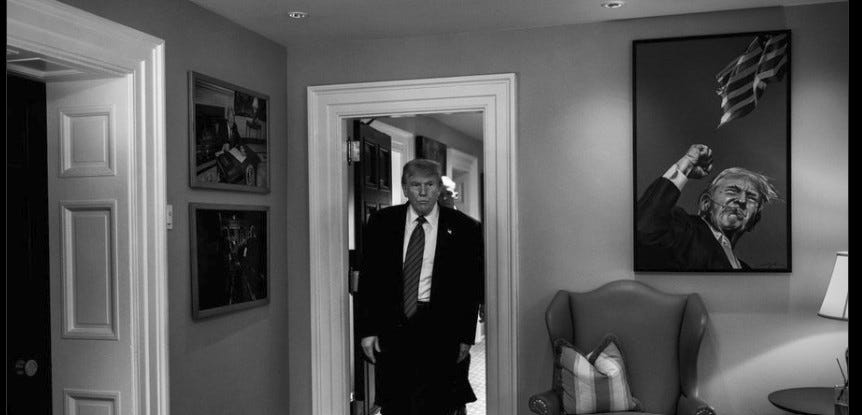
As early as Monday, according to Politico, President Donald Trump is expected to issue an executive order that will look like smart politics on its face, but it’s really a sign of the president’s political weakness.
Trump “plans to revive an effort to dramatically slash drug costs by tying the amount the government pays for some medicines to lower prices abroad, three people familiar with the matter told POLITICO. Early next week, Trump is expected to sign an executive order directing aides to pursue the initiative, called ‘most favored nation,’ for a selection of drugs within the Medicare program.”
Lowering prices is smarter than raising prices, which Trump has spent more time doing with his tariff orders.
But deeper into the story, we learn why Trump is trying to lower prescription drug prices by executive order: He can’t get Republicans in Congress to do it. Politico reported:
White House officials initially pressed congressional Republicans to draft in their megabill a “most favored nation” provision tying the cost of medicines in Medicaid to the lower prices developed countries pay abroad.
But that bid ran into opposition across the GOP conference and is unlikely to be included in the legislation, said one of the people familiar with the matter.
The White House is instead now expected to try to advance the drug price proposal on its own, using existing authorities to impose its “most favored nation” model.
Only four months into his term, when a president’s political capital should be at its most plentiful, and with Republican majorities in both chambers of Congress working on a filibuster-proof budget reconciliation bill, Trump is incapable of winning support for a cherished policy proposal.
Government intervention in the drug market does not come readily to most congressional Republicans. But most have been willing to run interference for Trump’s decidedly unconservative tariff regime, refusing to strip his tariff-setting powers. The previous Republican president, George W. Bush, successfully pressured most Republicans to add a prescription drug benefit to Medicare.
Sure, winning that vote required Bush and then-GOP congressional leadership to employ ethically questionable arm-twisting on the House floor, but such tactics seem quaint in the Trump Era. If that’s all it took to pass a bill, Trump would do it. That the 47th president isn’t even trying to do it exposes his waning influence on Capitol Hill.
With the legislative path closed, Trump is resorting to the executive order, which is legally perilous. Trump knows this because he tried to enact “most favored nation” unilaterally at the end of his first term, and two federal courts blocked the order on procedural grounds. (The Biden administration abandoned the Most Favored Nation policy, but in the Democrats’ second budget reconciliation bill—the Inflation Reduction Act—muscled through several other provisions that lower drug costs, including empowering Medicare to negotiate prices. Some argue the most favored nation plan won’t work because the drug companies can game the process.) The pharmaceutical companies will fight Trump’s order to the hilt and may well succeed in stymying it again.
In effect, Trump blew his political capital on the tariffs, sinking his job approval numbers, and giving congressional Republicans reason to question how tightly they want to tie their futures to his. Trump technically began his term as a lame duck, and now the lameness has started to have consequences.
The big unknown is whether this duck has become so lame that he can’t get budget reconciliation passed. A growing threat was spotlighted yesterday by Punchbowl News: the SALT caucus.
SALT refers to the state and local tax deduction, which used to be unlimited, but Trump’s first-term tax package capped the deduction at $10,000. The cap is a revenue raiser. As it tends to affect high-tax blue states, red state Republicans tend to like it. As it tends to affect upper-income households, some progressive Democrats like it too. But six blue state Republican House members in the bipartisan SALT Caucus really hate it. Five of them—enough to sink the bill—said this week that they are prepared to vote against any budget reconciliation bill that doesn’t significantly raise the cap, though they haven’t drawn a red line at a particular number. (Yesterday four House Republicans from New York issued a statement rejecting an offer to raise the cap to $30,000 as an “insulting” proposal that “risks derailing President Trump’s One Big Beautiful Bill.”)
Why haven’t they offered a number? Because the $10,000 cap is due to expire.
According to SALT caucus member Representative Mike Lawler of New York, “If nothing passes, SALT comes back unlimited, so it is on leadership to offer a number and negotiate from there. We are not negotiating against ourselves.”
Of course, we’ve seen many House Republicans talk a big game about bucking leadership and then fold. That may still happen again. But Punchbowl News observed yesterday:
This entire reconciliation package is a snake pit for moderate House Republicans. Some have privately argued to us that they’d be better off voting against it because of the cuts to Medicaid, SNAP and social programs. But SALT is also an acute and immediate problem that Republicans are nowhere close to solving.
What Lawler said is important—and is getting lost a bit in the debate over the state-and-local tax deduction limit. The SALT cap will disappear completely at the beginning of 2026 if Congress does nothing—and that’s precisely what the SALT Republicans want. So these members don’t have any incentive to cut a deal.
For a president who was going to be on the ballot again, a House Republican would have more incentive, because such a commander-in-chief could impress upon any member that defeating a major initiative would end their presidency and take down the party, too. For example, in 1993, months into President Bill Clinton’s first term, Senator Bob Kerrey famously held out on a deficit reduction package until the last minute, finally coughing up the deciding vote because “I could not and should not cast the vote that brings down your Presidency.”
Trump can’t play that card. Again, that doesn’t mean the SALT caucus or any other Republican faction will kill the reconciliation bill. But Trump’s inability to add his drug price plan to the measure should worry him and remind us that this duck is already lame.
The post Lame Duck Watch: Congressional Leaders Snub Trump on Drug Prices appeared first on Washington Monthly.


 1 month ago
12
1 month ago
12 










 Bengali (Bangladesh) ·
Bengali (Bangladesh) ·  English (United States) ·
English (United States) ·